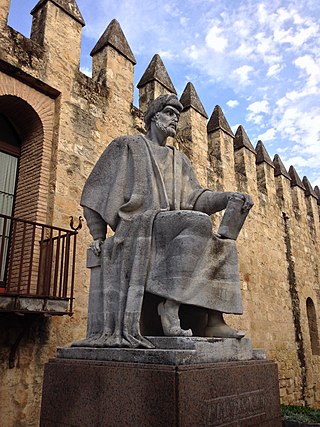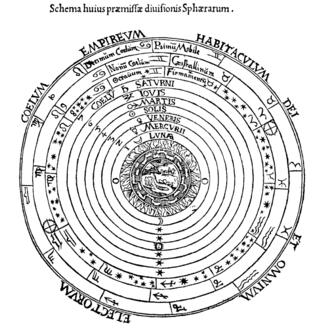Related Research Articles

Ibn Rushd, often Latinized as Averroes, was an Andalusian polymath and jurist who wrote about many subjects, including philosophy, theology, medicine, astronomy, physics, psychology, mathematics, Islamic jurisprudence and law, and linguistics. The author of more than 100 books and treatises, his philosophical works include numerous commentaries on Aristotle, for which he was known in the Western world as The Commentator and Father of Rationalism.

Hylomorphism is a philosophical doctrine developed by the Ancient Greek philosopher Aristotle, which conceives every physical entity or being (ousia) as a compound of matter (potency) and immaterial form (act), with the generic form as immanently real within the individual. The word is a 19th-century term formed from the Greek words ὕλη and μορφή. Hylomorphic theories of physical entities have been undergoing a revival in contemporary philosophy.

Islamic philosophy is philosophy that emerges from the Islamic tradition. Two terms traditionally used in the Islamic world are sometimes translated as philosophy—falsafa, which refers to philosophy as well as logic, mathematics, and physics; and Kalam, which refers to a rationalist form of Scholastic Islamic theology which includes the schools of Maturidiyah, Ashaira and Mu'tazila.
Early Islamic philosophy or classical Islamic philosophy is a period of intense philosophical development beginning in the 2nd century AH of the Islamic calendar and lasting until the 6th century AH. The period is known as the Islamic Golden Age, and the achievements of this period had a crucial influence in the development of modern philosophy and science. For Renaissance Europe, "Muslim maritime, agricultural, and technological innovations, as well as much East Asian technology via the Muslim world, made their way to western Europe in one of the largest technology transfers in world history." This period starts with al-Kindi in the 9th century and ends with Averroes at the end of 12th century. The death of Averroes effectively marks the end of a particular discipline of Islamic philosophy usually called the Peripatetic Arabic School, and philosophical activity declined significantly in Western Islamic countries, namely in Islamic Spain and North Africa, though it persisted for much longer in the Eastern countries, in particular Persia and India where several schools of philosophy continued to flourish: Avicennism, Illuminationist philosophy, Mystical philosophy, and Transcendent theosophy.

Abu Nasr Muhammad al-Farabi, known in the Latin West as Alpharabius, was an early Islamic philosopher and music theorist. He has been designated as "Father of Islamic Neoplatonism", and the "Founder of Islamic Political Philosophy".

Averroism refers to a school of medieval philosophy based on the application of the works of 12th-century Andalusian philosopher Averroes, a commentator on Aristotle, in 13th-century Latin Christian scholasticism.

Aristotelianism is a philosophical tradition inspired by the work of Aristotle, usually characterized by deductive logic and an analytic inductive method in the study of natural philosophy and metaphysics. It covers the treatment of the social sciences under a system of natural law. It answers why-questions by a scheme of four causes, including purpose or teleology, and emphasizes virtue ethics. Aristotle and his school wrote tractates on physics, biology, metaphysics, logic, ethics, aesthetics, poetry, theatre, music, rhetoric, psychology, linguistics, economics, politics, and government. Any school of thought that takes one of Aristotle's distinctive positions as its starting point can be considered "Aristotelian" in the widest sense. This means that different Aristotelian theories may not have much in common as far as their actual content is concerned besides their shared reference to Aristotle.

In the study of the human mind, intellect is the ability of the human mind to reach correct conclusions about what is true and what is false in reality; and includes capacities such as reasoning, conceiving, judging, and relating. Translated from the Ancient Greek philosophical concept nous, intellect derived from the Latin intelligere, from which the term intelligence in the French and English languages is also derived. The discussion of intellect can be divided into two areas that concern the relation between intelligence and intellect.

Abū Bakr Muḥammad ibn Yaḥyà ibn aṣ-Ṣā’igh at-Tūjībī ibn Bājja, best known by his Latinised name Avempace, was an Andalusi polymath, whose writings include works regarding astronomy, physics, and music, as well as philosophy, medicine, botany, and poetry.
This article covers the conversations between Islamic philosophy and Jewish philosophy, and mutual influence on each other in response to questions and challenges brought into wide circulation through Aristotelianism, Neo-platonism, and the Kalam, focusing especially on the period from 800–1400 CE.

On the Soul is a major treatise written by Aristotle c. 350 BC. His discussion centres on the kinds of souls possessed by different kinds of living things, distinguished by their different operations. Thus plants have the capacity for nourishment and reproduction, the minimum that must be possessed by any kind of living organism. Lower animals have, in addition, the powers of sense-perception and self-motion (action). Humans have all these as well as intellect.
In philosophy, potentiality and actuality are a pair of closely connected principles which Aristotle used to analyze motion, causality, ethics, and physiology in his Physics, Metaphysics, Nicomachean Ethics, and De Anima.
John Philoponus, also known as John the Grammarian or John of Alexandria, was a Coptic Monophysite philologist, Aristotelian commentator and Christian theologian from Alexandria, Byzantine Egypt, who authored a number of philosophical treatises and theological works. John Philoponus broke from the Aristotelian–Neoplatonic tradition, questioning methodology and eventually leading to empiricism in the natural sciences. He was one of the first to propose a "theory of impetus" similar to the modern concept of inertia over Aristotelian dynamics. He is also the historical founder of what is now called the Kalam cosmological argument.

Nous, from Greek: νοῦς, is a concept from classical philosophy, sometimes equated to intellect or intelligence, for the faculty of the human mind necessary for understanding what is true or real.
The passive intellect, is a term used in philosophy alongside the notion of the active intellect in order to give an account of the operation of the intellect (nous), in accordance with the theory of hylomorphism, as most famously put forward by Aristotle.

Moses Narbonne, also known as Moses of Narbonne, mestre Vidal Bellshom, maestro Vidal Blasom, and Moses Narboni, was a medieval Jewish philosopher and physician born in Perpignan in the Kingdom of Majorca at the end of the thirteenth century. He died sometime after 1362. He began studying philosophy with his father when he was thirteen and then studied with Moses and Abraham ben David Caslari. He studied medicine and eventually became a successful physician, and was well versed in Biblical and rabbinic literature.

The Thomas-Institut is a research Institute whose function is to study medieval philosophy by preparing critical editions as well as historical and systematic studies of medieval authors.

Medieval philosophy is the philosophy that existed through the Middle Ages, the period roughly extending from the fall of the Western Roman Empire in the 5th century until after the Renaissance in the 13th and 14th centuries. Medieval philosophy, understood as a project of independent philosophical inquiry, began in Baghdad, in the middle of the 8th century, and in France and Germany, in the itinerant court of Charlemagne in Aachen, in the last quarter of the 8th century. It is defined partly by the process of rediscovering the ancient culture developed in Greece and Rome during the Classical period, and partly by the need to address theological problems and to integrate sacred doctrine with secular learning. This is one of the defining characteristics in this time period. Understanding God was the focal point of study of the philosophers at that time, Muslim and Christian alike.
Aql bi al-Quwwah is the first stage of the intellect's hierarchy in Islamic philosophy. This kind of reason is also called the potential or material intellect. In philosophy thus kind of intellect also called as passive intellect.

The unity of the intellect, a philosophical theory proposed by the medieval Andalusian philosopher Averroes (1126–1198), asserted that all humans share the same intellect. Averroes expounded his theory in his long commentary on Aristotle's On the Soul to explain how universal knowledge is possible within the Aristotelian philosophy of mind. Averroes's theory was influenced by related ideas propounded by previous thinkers such as Aristotle himself, Plotinus, Al-Farabi, Avicenna and Avempace.
References
- 1 2 Davidson, Herbert (1992), Alfarabi, Avicenna, and Averroes, on Intellect, Oxford University Press, p. 3.
- 1 2 Sachs, Joe (2001), Aristotle's On the Soul and On Memory and Recollection, Green Lion Press.
- ↑ See Metaphysics 1072b.
- ↑ Davidson, Herbert (1992), Alfarabi, Avicenna, and Averroes, on Intellect, Oxford University Press.
- ↑ Maimonides, Guide for the Perplexed (translator: Michael Friedländer), Dover: New York, 1904, p. 225.
- ↑ Summa Theologiae, part I, question 79, article 4 – Is the active intellect something that belongs to our soul? (PDF). Translated by Alfred J. Freddoso. p. 600.
{{cite book}}:|website=ignored (help)